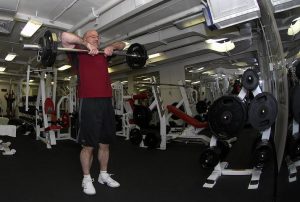 Ironic, isn’t it? The only constant in life is change…and the most annoying constantly changing thing is how your body deals with fitness and weight issues as it ages. Wouldn’t it be great if in your 30s and 40s you had the same energy and drive that kept you almost effortlessly fit in your 20s? And wouldn’t it be just as wonderful if the exercise routine and eating habits that you finally found to in your 30s and 40s still worked at 50 and beyond? We wish there was some good news to share here about how to keep the status quo working but, unfortunately, that’s not how human bodies are built. The best thing you can do for weight loss and fitness as you age is to embrace change. Acknowledge you’re going to have to adjust how you do things and get on board whole heartedly.
Ironic, isn’t it? The only constant in life is change…and the most annoying constantly changing thing is how your body deals with fitness and weight issues as it ages. Wouldn’t it be great if in your 30s and 40s you had the same energy and drive that kept you almost effortlessly fit in your 20s? And wouldn’t it be just as wonderful if the exercise routine and eating habits that you finally found to in your 30s and 40s still worked at 50 and beyond? We wish there was some good news to share here about how to keep the status quo working but, unfortunately, that’s not how human bodies are built. The best thing you can do for weight loss and fitness as you age is to embrace change. Acknowledge you’re going to have to adjust how you do things and get on board whole heartedly.
Keep Exercise in the Plan
Weight gain with age is a vicious cycle. Your metabolism slows down and burns less calories and your energy levels drop. The right foods may give you more energy, but you won’t typically be able to eat as much as you used to and still maintain or lose weight. That’s why, although diet does play an important part, physical activity is the key for most health issues throughout any phase of your life, but especially as you age.
Resistance training, specifically, is as close to the magic bullet as you’ll find. Studies have shown that it increases lean body weight and the metabolism, reduces fat, improves balance, motor control, and cognitive abilities. Exercising with resistance training can improve blood pressure, keep your heart healthy, bring down your cholesterol, and increase bone density. Plus, it helps manage chronic illness such as diabetes much better than medication does.
There’s no form of exercise—resistance or aerobic—that’s one-size-fits-all. What works for you might not work for someone else, and what the other guy swears by might not be enjoyable enough to you to keep you motivated and coming back for more. The answer to that is to try different forms of exercise. Changing things up is an effective strategy any time, but particularly as you age because it forces your body to switch gears and start burning calories again. Move as much as possible in general, such as pacing the room whenever you’re on the phone or jogging in place during every commercial break while you’re watching TV. But also schedule actual workouts into your weekly routine.
In 2018, the CDC updated their physical activity guidelines. Although most of the basics remained the same, such as working out with resistance twice a week and averaging about 150 minutes a week of aerobic exercise, there’s now some additional guidelines for older adults. In general, the guidelines encourage maintaining exercise throughout your lifetime but paying attention to your health and your body’s cues so you can stay as fit and healthy as possible without overdoing it and risking injury or wellness. That boils down to an important takeaway: know how to listen to your body and recognize your limits, but push yourself right up to those limits rather than using them as an excuse not to exercise.
The Diet Connection

You’ll need more fruits and veggies as you age and less protein, but a healthy weight always boils down to balanced nutrition.
Even though trying to control diet alone isn’t enough for successful weight loss at most ages, it’s still an important enough factor that you should never feel free to eat as much as you want. When you’re young, a lightning-fast metabolism might make that possible, but it’s a hard habit to break when your metabolism changes. The National Institute of Diabetes and Digestive and Kidney Diseases has a cool little tool that helps you determine how many calories you need to eat each day to lose or maintain weight based on all the factors that matter. Pair it up with the My Plate for Older Adults (yes, your nutritional needs along with your calorie requirements change as you age), and you’ll have a formula for successful weight management no matter how old you are.
Meals are another time when it comes in handy to be in touch with your body. How do you feel after eating a high-protein meal? Or after one loaded with carbs? Federal guidelines are generalized and work for most people but if you find you don’t feel all that great when you eat a lot of meat, cut back. Try a few veggie meals each week, but supplement with amino acids and don’t shy away from plant protein—researchers have found that eating a variety of plants known for supplying protein like grains, beans, nuts, tofu, and legumes, throughout the day is sufficient for meeting nutritional protein needs.
And, just because you’re aging, that doesn’t mean you have to deprive yourself. Naturally, you’ll want to keep a closer eye on your salt and sugar intake, especially if you have issues with diabetes and blood pressure. But allowing yourself to indulge now and then won’t derail your whole weight control and fitness plan. In fact, cheating can help you stick to your diet by keeping you from feeling deprived and giving you something to look forward to.

Looking and feeling good is possible no matter where you are in life–not “for your age”–but in spite of it!
Above all, take it all one day at a time. Move around. Schedule exercise onto your calendar and stick to the plan as much as possible. Eat healthy most of the time but allow some leniency for a treat on a regular basis. Then do it all over again tomorrow—and the next day and the next. Pretty soon, you’ll notice some changes have taken place and the best part will be how great you look and feel—not “for your age” but regardless of it.


Another great post! Thanks Lisa for the continued inspiration and education!